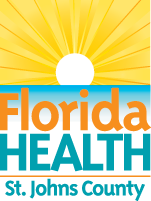It's a New Day in Public Health.
The Florida Department of Health works to protect, promote, and improve the health of all people in Florida through integrated state, county, and community efforts.
Sewage Spills and Private Drinking Wells
October 14, 2016
A Message on Septic Systems and Private Drinking Water
ST. AUGUSTINE, FL – As St. Johns County residents, businesses, and visitors continue to clean and repair storm damaged homes, buildings and properties, the DOH-St. Johns County Health Department urges residents and visitors to take precautionary measures to avoid health risks from storm-related flooding and potential impacts to septic systems and private drinking wells.
Avoid Health Risks Associated with Storm-related Flooding: Heavy rainfall from hurricanes may result in flood waters that are contaminated with sewage. Proper cleaning and disinfecting procedures are recommended to prevent illness.
For contaminated items and sewage spills inside your home:
- Wear protective clothing such as rubber boots and waterproof gloves.
- Wash all linens and clothing in hot water or have them dry cleaned.
- Discard items that cannot be washed or dry cleaned, such as mattresses, carpeting, wall coverings and upholstered furniture.
- Do not mix ammonia cleansers with bleach as toxic vapors will form.
- Clean walls, hard-surfaced floors, and other household surfaces with soap and water and disinfect with a solution of 1/4 cup of bleach in one gallon of water. Once cleanup is complete, dry out affected items to prevent the growth of mold. For more information about indoor air quality and mold growth, contact Florida Department of Health (850) 245-4288 or visit www.floridahealth.gov/indoorair.
For sewage leaks or spills outside your home:
- If connected to the County or City Sewer, notify your provider of the spill/leak.
- If connected to a private septic tank, find a registered septic tank contractor to assist with clean up.
- Minor spills requiring immediate attention may be disinfected with regular garden lime from a garden shop. Follow the label instructions for required personal protective equipment. Use lime outdoors only.
- o Sprinkle the lime onto the spill so the spill is dusted mostly white on the surface. If the residue is thicker in some places use a rake to mix the lime and the residue.
- After a day, rake up the thicker residue and place it in a trash bag for disposal with the other trash. Use a sprinkler or hose to water the lime and residue into the soil.
- Let the area dry in the sun for a day before allowing access. If there is still white lime dust visible on the yard, water it in until the white dust is gone.
For homes served by private drinking wells potentially impacted by storm water, if in doubt about the safety of your water:
- Boil water before use, holding it at rolling boil for at least one minute before using it for drinking, washing, cooking, etc. - OR –
- Use commercially packaged bottled water, especially for mixing baby formula.
- For more information, contact Florida Department of Health (850) 245-4250 or visit https://www.floridahealth.gov/environmental-health/private-well-testing/index.html
Follow proper hygiene procedures to prevent illness:
- Keep hands and fingers away from the nose, mouth, eyes and ears.
- Wash hands with soap and water immediately after cleanup efforts as well as before eating or drinking.
- Keep fingernails short and clean. Use a stiff brush to remove dirt and foreign materials.
- Do not store fresh work clothes with used/soiled work clothes.
- Shower as soon as possible after cleaning up sewage or sewage contaminated flood waters.
- For further information, please visit https://www.floridahealth.gov/environmental-health/index.html or www.FloridaDisaster.org.
About the Florida Department of Health - The department works to protect, promote and improve the health of all people in Florida through integrated state, county and community efforts.
Follow us on Twitter at @HealthyFla and on Facebook. For more information about the Florida Department of Health please visit www.FloridaHealth.gov





Connect with DOH